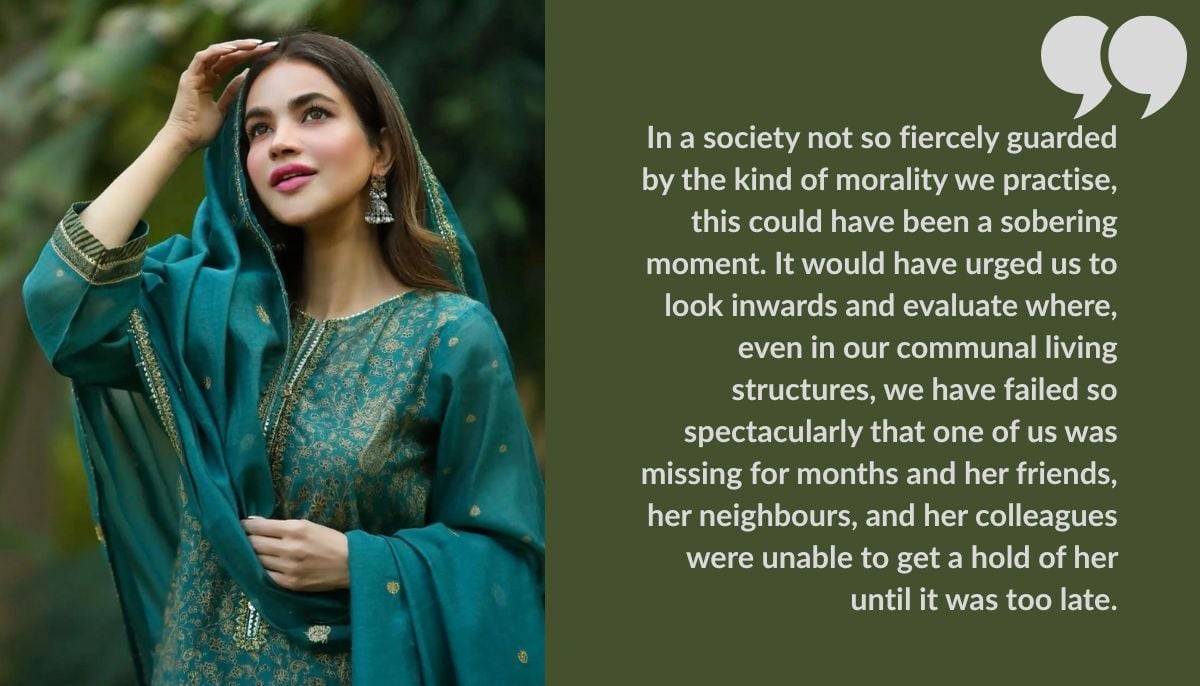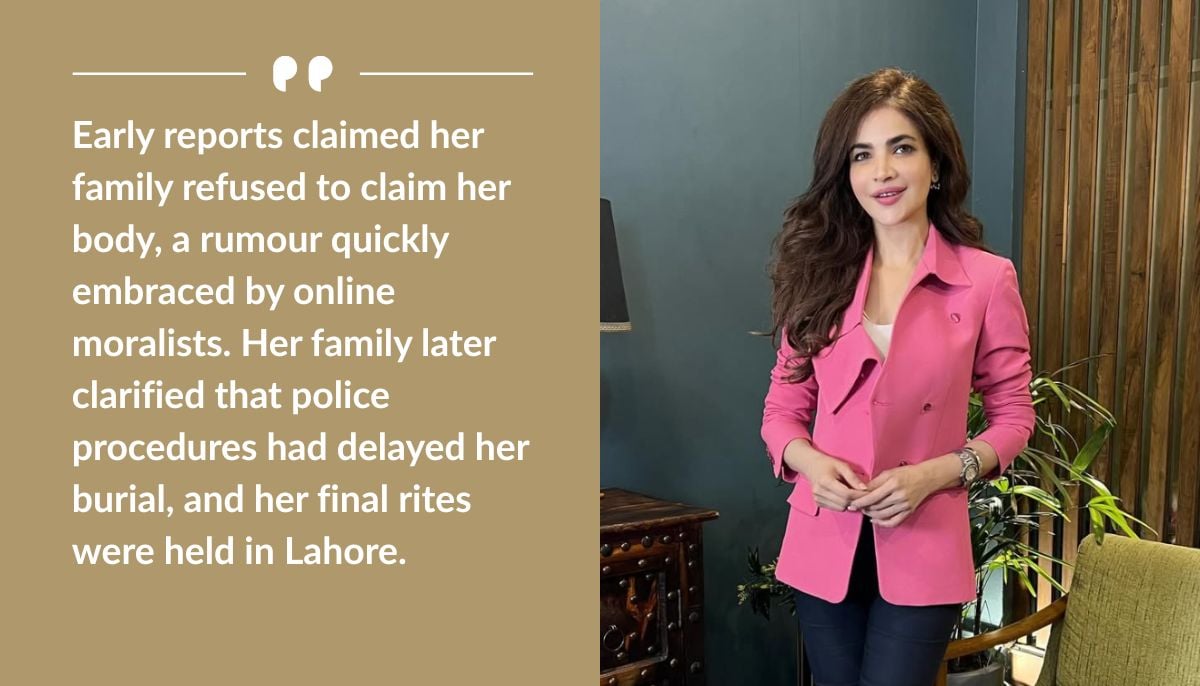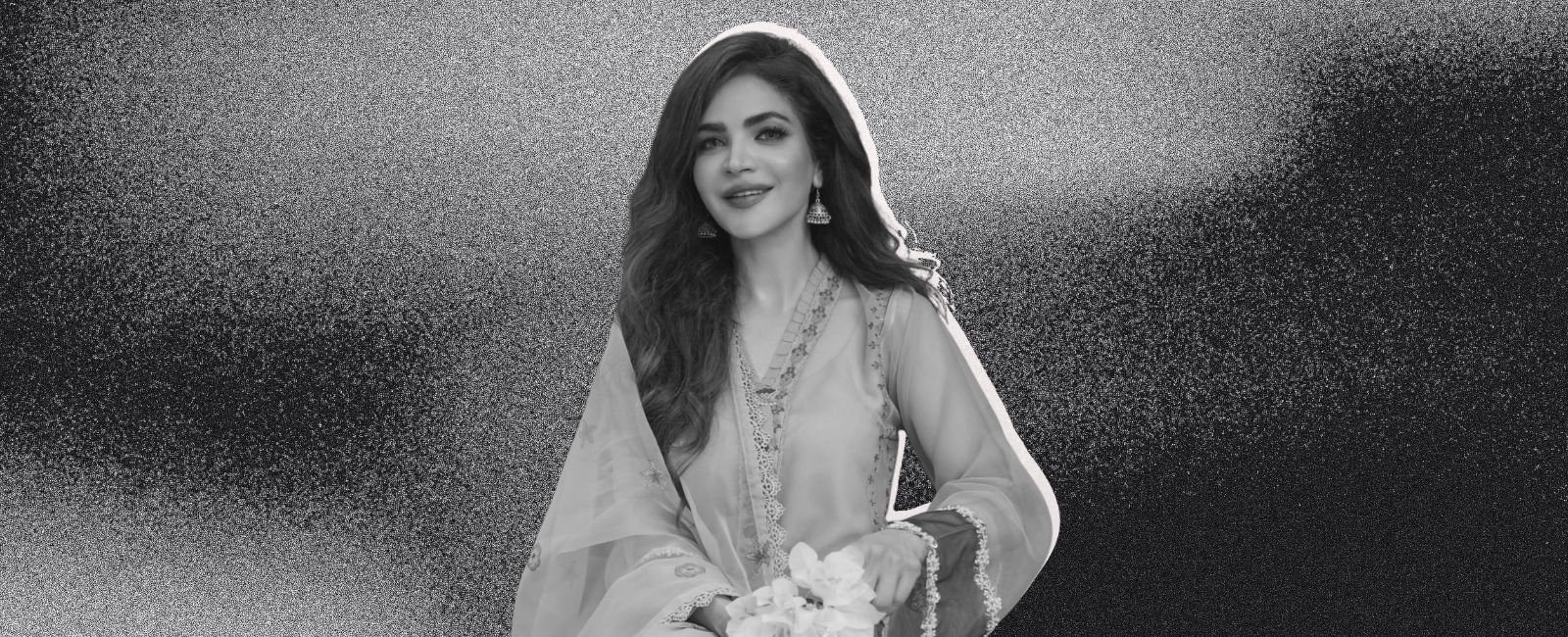The myth of 'good woman' in Pakistan
What is goodness, after all, if not to look at someone’s suffering and smugly think to oneself "can never be me!"

It appears, at least to our moral gatekeepers, that there are no good women left in Pakistan.
And so, perhaps understandably, people celebrate their deaths, leave their decaying bodies unclaimed, and repurpose their broken corpses as stark reminders — cautionary examples used to sermonise virtue. They preach goodness from behind their monetised YouTube accounts, from behind verified Twitter accounts, from the benches of the superior courts, from their pulpits, and from their news channels, and drawing rooms. And for their guidance, we are eternally grateful.
The most recent example of this staunch moral leadership surfaced in the aftermath of Humaira Asghar's death. Asghar, a model and an actor, passed away (according to forensic reports) almost eight to ten months ago in Karachi. Asghar was estranged from her family and lived alone in the city, which is why her remains were only discovered recently in her home.
In a society not so fiercely guarded by the kind of morality we practise, this could have been a sobering moment. It would have urged us to look inwards and evaluate where, even in our communal living structures, we have failed so spectacularly that one of us was missing for months and her friends, her neighbours, and her colleagues were unable to get a hold of her until it was too late. It could have served as a moment of reflection — a chance to reckon with what we owe each other and those we share a community with. But doing so would have distracted us from the main issue of societal anxiety: is this what the end of bad women looks like?
And so, heroes as they are, men rushed to wrestle with the societal ills that have befallen us: Women, isolated from families, living independently. Early reports claimed her family refused to claim her body, a rumour quickly embraced by online moralists. Her family later clarified that police procedures had delayed her burial, and her final rites were held in Lahore. But social media, quick to react, erupted in outrage over the family’s initial response. And so, once again, it fell on the shoulders of the only subgroup of society holding our moral fabric together, men on the internet, to ensure we do not stray too far.

“Is this not the logical conclusion to the feminist thought that has slithered into our society while we had looked away?” they asked, holding up the mirror we so desperately need. “Could you, after all, claim a daughter who decided to build a career in the showbiz industry, even in death?” they wondered. And while perhaps there exists a news media out there, that may have interjected to ask that if a daughter can be abandoned for choosing to defy divine orders, why are parents not expected to meet the same standards of religious commitment; is it God's defiance, or defiance of the father, that truly enrages the men online? Local journalistic heroes ensured that introspection like this does not sidetrack us from what's at stake: Bad women meeting bad ends.
So, they picked up their microphones and rushed to the site of the tragedy, much like an ant infestation at the sight of unwrapped candy to ask her neighbours questions that matter; were there any “unusual activities" at Humaira’s residence? Were there any “parties”? After all, how can we be sure that a woman, whose death we were unaware of for months, was not leading our society to doom by indulging in drugs and sex? Perhaps, if she had wanted dignity in death, in our society, she should have chosen a different life path.
That’s the problem with bad women; they just keep choosing the wrong paths in life. Only last month, we came across another such woman. A teenager, but our news media insisted she was a woman, so she must have been. Sana Yousuf, 17, had chosen the abhorrent life path of existing on social media. Her chirpy personality and zest for life drew a million followers on Instagram and TikTok, so naturally, in our moral fortress, that spirit had to be snuffed out. Men, who did not know her, had probably only heard her name for the first time in her death, and thanked God on the internet for ridding us of her. Because what kind of a woman openly flaunts her sense of humour and her hope for peace on the internet? A bad one. And so, when a good man shot her dead in her home for saying no, was that not the logical conclusion of her “Tiktoker” life?
Just days earlier, Justice Ali Baqir Najafi had reminded women of the need to be more moral — around the same time the Supreme Court finally closed the chapter on Zahir Jaffer, after four gruelling years of proceedings. Absolutely horrifying that Jaffer had raped and beheaded a woman in his home with the aid of his employees. But while condemnable, can women also make sure they are not in relationships that make their rapes and beheadings possible? A question that has also, apparently, weighed heavily on journalistic icons like Imran Riaz Khan, who once — from his high moral ground — questioned, before his nearly six million YouTube subscribers, what kind of woman ends up murdered in a strange man’s home. The implication being: should women not take some responsibility for upholding our society’s moral standards? After all, how long can men be expected to fight these battles of virtue alone?
And to be fair, there are women who do. Not all of them seem to be lost cases, blinded by the frenzied desire for autonomy over their lives. And so soon after a Humaira, a Sana or a Noor, there are hundreds of women out there, clamouring to uphold the mantle of female moral accountability on social media. Agreeing with the men, that these bad women who have died should have done better. That they should have not dreamt, not laughed for the world to see, not trusted men. They remind us that even on the bleakest nights when it appears all Pakistani women have been lost to the hedonistic desire for more agency, we may still have good women.

Good women remind us that they are safe because they were not led astray by dreams of a world that does not shrink for them. Good women look at one of their sisters’ suffering and instantly chart out a plan to prevent it from happening to them. Good women — who do not feel rage as fellow countrymen tear apart the dignity of their kind, who do not feel disgusted at the vulturous tendency to build careers by mudslinging the dead, who know the trick is to not demand, not defy, not deny — are the ones we celebrate.
What is goodness, after all, if not to look at someone’s suffering and smugly think to oneself "can never be me!".
And perhaps, this is just my shortcoming, for I, too, am a bad woman, but I just do not understand how it can never be them. Research suggests at least 90% of women in Pakistan have suffered some form of domestic violence. As many as 346 women were killed in honour crimes in 2024. In the same year, 5,339 cases of rape were reported (which makes it over 14 rape cases a day). In 2022, Acid Survivors Foundation (ASF) claimed, there were about 200 cases of acid attacks on women every year, with the number on the rise. Additionally, according to DRF, 2,741 women complained about cyber harassment and threats. And while incidents of violence against women continue to rise, conviction rates remain concerningly low. Only 1.3% of the accused are convicted in the case of domestic violence, the national conviction rate for rape stands at just 0.5%, and for kidnapping and abduction cases the conviction rate is even lower at 0.1%. These are staggering numbers; one must imagine that not all these women were bad. Some, surely, must be good women who did not deserve this treatment.
And if there were, in fact, some good women hidden in these numbers one has to wonder, why their ends are no different than those of the bad women. How are good women so sure they could never be one of them — the ones led astray by the dream of living on their own terms? In this moral utopia men have worked so hard to build — where they live pure and sinless — are good women better off than the bad ones? Are they not worse? At least bad women get op-eds; good ones seem to only die a statistic.
And so, one is forced to ask, what is the promise of being a good woman in this country?
Aimun Faisal is a cultural critic based in Karachi.
Header and thumbnail image by Geo.tv




